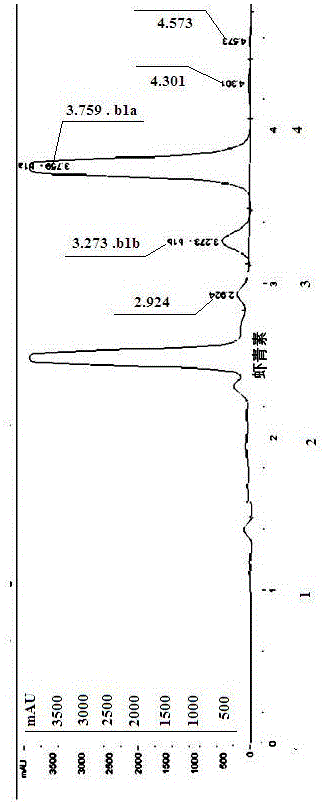A kind of astaxanthin high-yield bacterial strain and its application
A high-yield strain, astaxanthin technology, applied in fungi, microorganisms, biochemical equipment and methods, etc., can solve the problems of inability to meet industrial production, low astaxanthin yield, etc., and achieve the effect of great social significance and economic value.
- Summary
- Abstract
- Description
- Claims
- Application Information
AI Technical Summary
Problems solved by technology
Method used
Image
Examples
Embodiment 1
[0035] Example 1 This example illustrates the Phaffia yeast ( Xanthophyllomyces dendrorhous ) method for mutagenesis of vr01.
[0036] Phaffia yeast preserved in the laboratory ( Xanthophyllomyces dendrorhous )vr01 is the starting strain for mutagenesis, and the specific steps are as follows:
[0037] (a) In order to obtain a high-yielding strain of astaxanthin, after comparing various mutagenesis methods, the method of mutagenizing the strain with nitrosoguanidine (NTG) was selected. from Phaffia yeast in liquid medium ( Xanthophyllomyces dendrorhous ) The cell suspension to be mutated was obtained from the vr01 culture. At 20°C and 100rpm, the 10 8 Cells / mL cell suspension in 0.1M sodium citrate buffer of 250ug / Ml NTG solution, pH 5.0, warm bath for 60-120min. (b) The mutagenized cells were then cultured in liquid intermediate medium for 10 h at 23 °C and 100 rpm.
[0038](c), screening of mutagenic strains:
[0039] Screening: Introduce the culture solution obtain...
Embodiment 2
[0043] Example 2 This example illustrates the high-yield strain Phaffia ( Xanthophyllomyces dendrorhous ) VR-032 fermentation process for producing astaxanthin.
[0044] The medium formula used in this embodiment:
[0045] The solid medium is: 3.0% sucrose, 1.0% malt extract powder, 1.5% agar powder, pH 5.8-6.0, and the rest is water.
[0046] The seed medium is: 4.0% sucrose, 2.0% peanut powder, 0.2% potassium dihydrogen phosphate, 0.05% magnesium sulfate, pH 5.8~6.0, and the rest is water.
[0047] The fermentation medium is: 2.0% sucrose, 4.0% peanut cake powder, 0.2% potassium dihydrogen phosphate, 0.05% magnesium sulfate, vitamin B 1 0.0002%, pH 5.8~6.0, the rest is water.
[0048] Inoculate Phaffia yeast VR-032 on solid medium, culture temperature is 21°C, and culture time is 48h; inoculate the solid-cultured Phaffia yeast VR-032 culture into seed medium, and fill the liquid in a 250mL culture bottle The volume is 30mL, the culture temperature is 21°C, and the rota...
Embodiment 3
[0049] Example 3 This example illustrates the morphological, physiological and biochemical characteristics and passage stability of mutant strains
[0050] Phaffia yeast ( Xanthophyllomyces dendrorhous ) VR-032, the morphological, physiological and biochemical characteristics are as follows: colony color: off-white; aerobic mode: aerobic growth; colony size: 4~7 mm; optimum growth temperature: 22°C; optimum growth pH: 7.0~ 7.2; Bacterial morphology: round colony, dull; Gram stain: positive.
[0051] In the fermentation medium using sucrose as a carbon source (fermentation culture conditions are the same as in Example 2), the mutant strain Phaffia ( Xanthophyllomyces dendrorhous ) The output of VR-032, the passage stability of the observation period, and the strain passage fermentation test results are shown in Table 1:
[0052] Table 1 High-yielding mutant strain Phaffia ( Xanthophyllomyces dendrorhous ) VR-032 stability test
[0053] Number of passages Asta...
PUM
 Login to View More
Login to View More Abstract
Description
Claims
Application Information
 Login to View More
Login to View More - R&D
- Intellectual Property
- Life Sciences
- Materials
- Tech Scout
- Unparalleled Data Quality
- Higher Quality Content
- 60% Fewer Hallucinations
Browse by: Latest US Patents, China's latest patents, Technical Efficacy Thesaurus, Application Domain, Technology Topic, Popular Technical Reports.
© 2025 PatSnap. All rights reserved.Legal|Privacy policy|Modern Slavery Act Transparency Statement|Sitemap|About US| Contact US: help@patsnap.com

